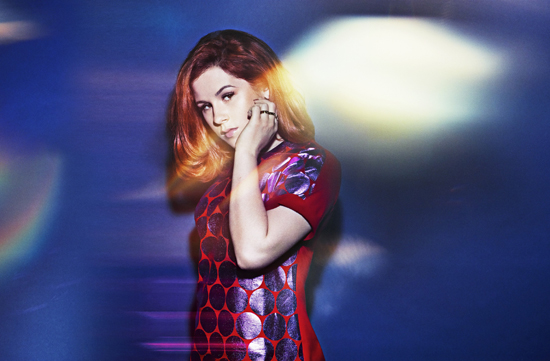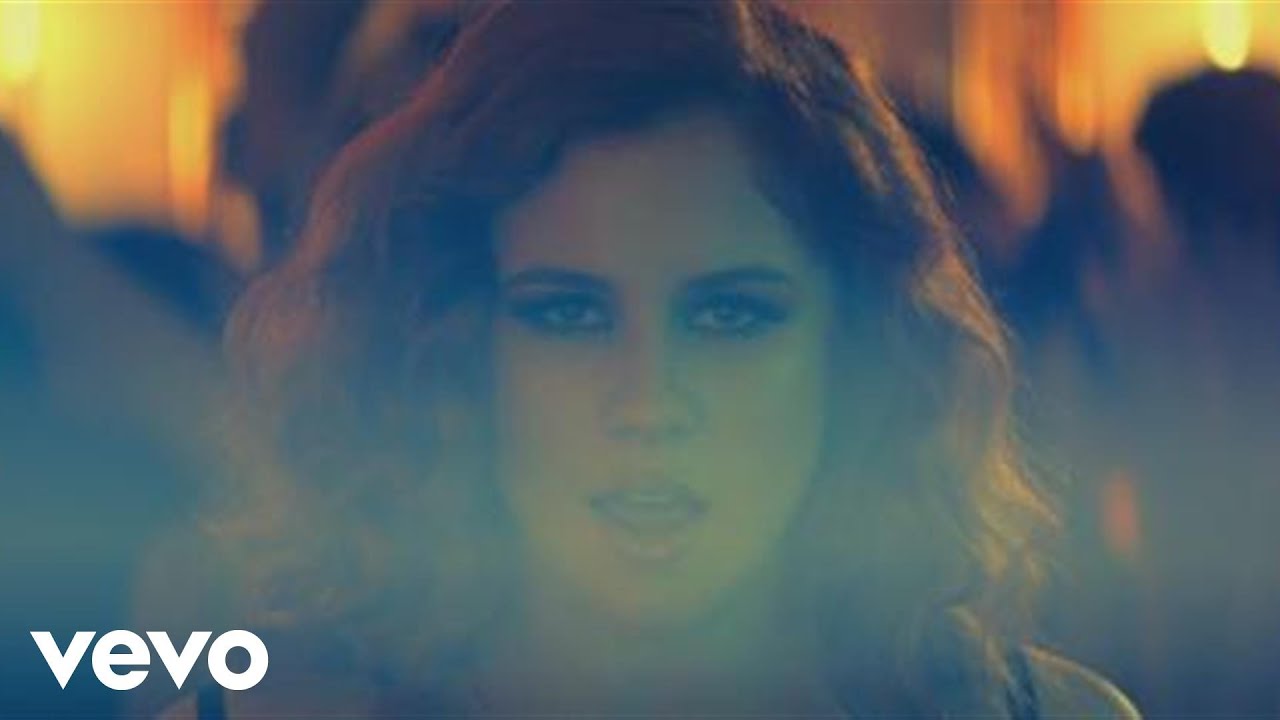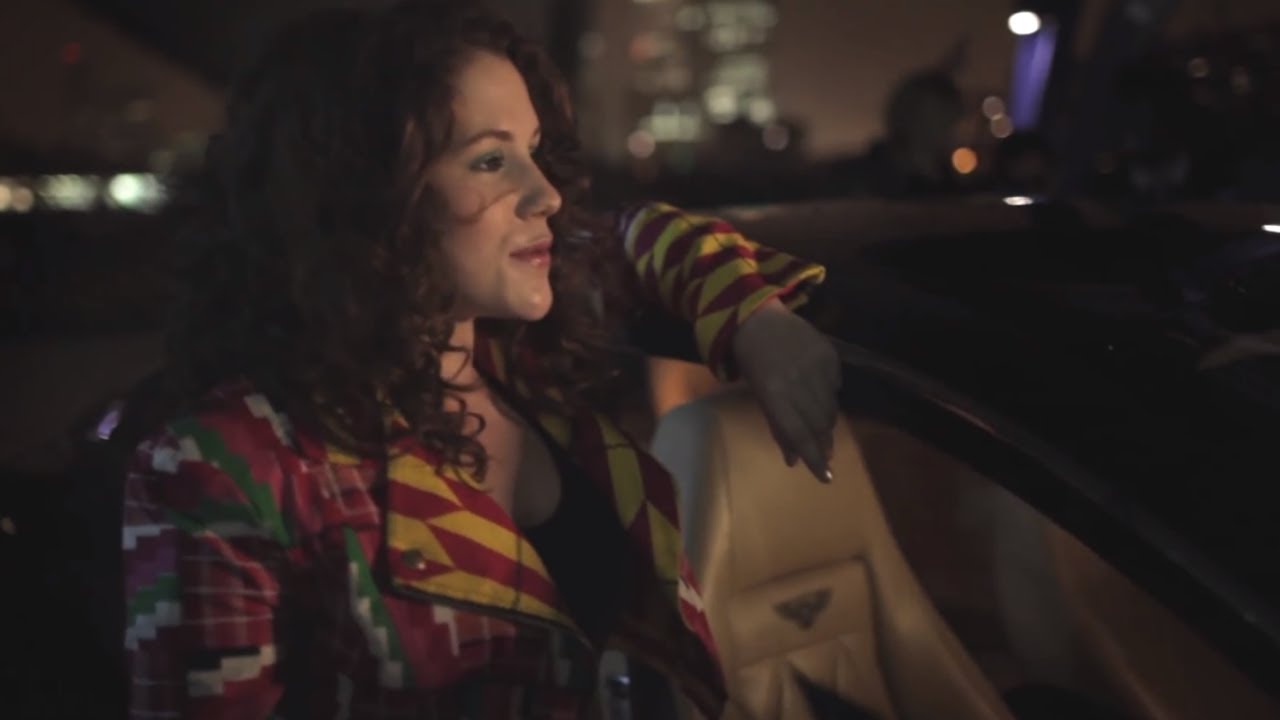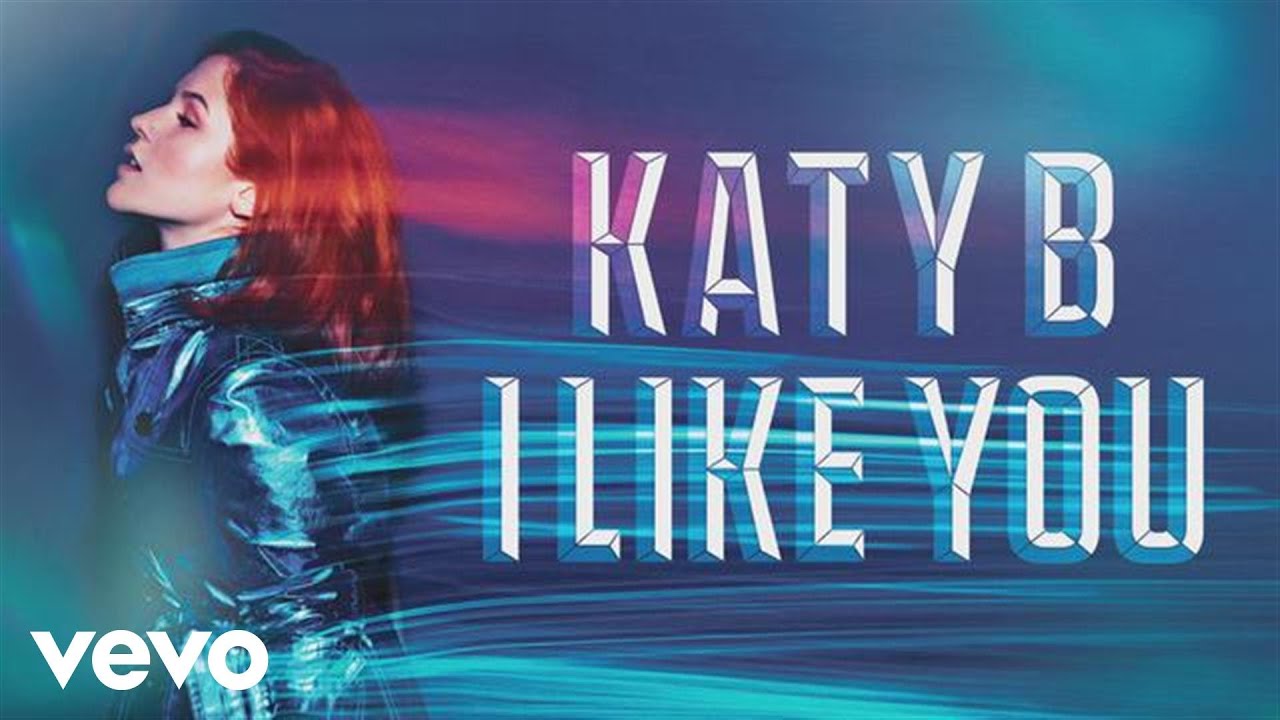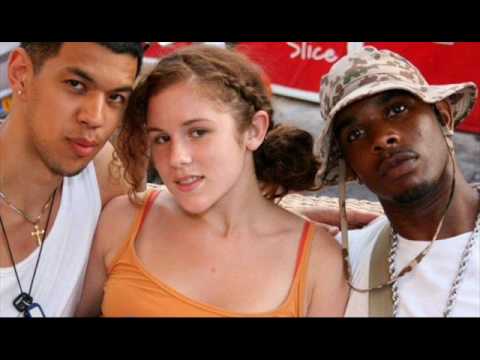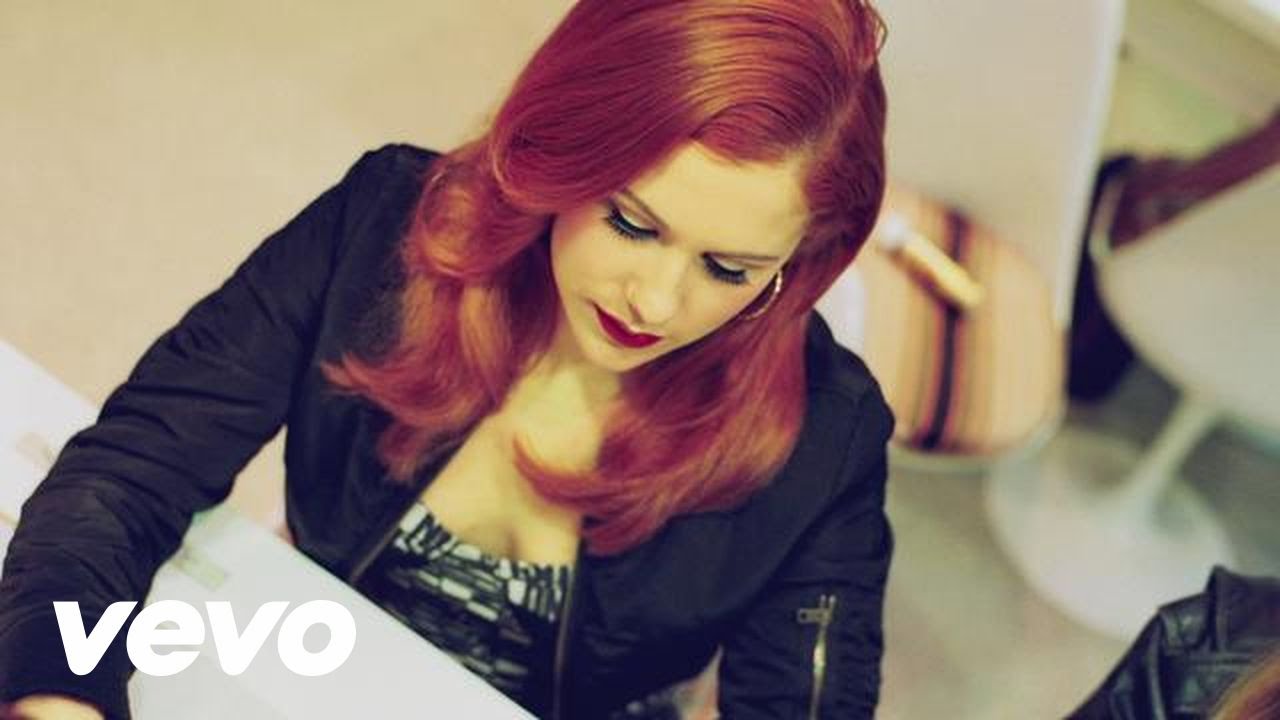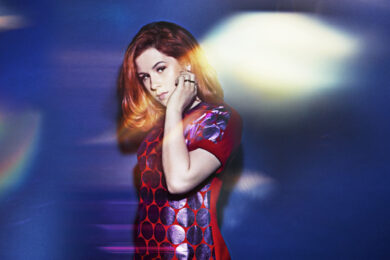South London’s Katy Brien established herself as the most important British pop star around back in 2011, when her debut album On A Mission bridged the gap between the underground and the mainstream in a way few others have ever matched.
Its follow-up, Little Red, maintains those roots – the chemistry between Katy and Geeneus, who is still responsible for the bulk of her production, makes for one of the finest producer-singer pairings of our times. But it’s a more interior, often sombre album: one that’s less geared towards partying and more about contemplating the emotions that run through your head during and following a night out. (Pro tip: the sequencing of the continuous mix available on the deluxe edition makes it all click into place.)
With Little Red released this week through Rinse, Katy sat down with the Quietus to talk about how her approach to life and music has changed since she transformed from UK funky vocalist made good to proper pop star.
A lot of the appeal of On A Mission was its relatability – the raver next door who reminded everyone of themselves and their friends. Did you find it harder to maintain this after its success?
Katy Brien: That was the thing I found quite hard. People saying you can’t go here, you can’t do this – it was weird feeling like you have to be a star when I felt exactly the same. It was really confusing for me. I feel like I’ve come out the other end, full circle – like, actually, I’m just going to do what I’ve always done. So I still go out in South London with my friends to places I love which are real and where I feel comfortable. And people do recognise me, but most of the time they’re lovely and just want to have a chat about music, which is always a nice conversation to have.
So you still go out raving where you want, then. Did you find it easy to persuade your label or managers it was ok?
KB: My managers would start freaking out because I’d be in Brixton McDonald’s at 4am. They were like, what’s going on? I was like… well, I was hungry! I just wanted food! I like to work hard and play hard. If I haven’t been out in a while I just get upset, especially if I’m listening to the radio – I feel like the beat’s being wasted in a car, I should be dancing to it somewhere. The last time I went raving? Sunday! I went to Horse Meat Disco in Vauxhall, Skream was playing. I went for a little boogie. He’s really passionate about his disco direction.
People get recognised in the kind of clubs you go to all the time – producers and DJs as well – but I can’t imagine getting mobbed or anything.
KB: And I’m quite short, so I’m at people’s armpit height. And it’s dark in good clubs, anyway. It’s not like walking around on Oxford Street in the middle of the day. I’ve got quite protective friends, too. They handle me well.
You should have pointed out that this sort of lifestyle is your inspiration.
KB: Yeah, do you know what I mean! I’m quite a people-watcher. Sometimes, me and my friends would get the bus home from school in New Cross to Peckham, and I’d sit there waiting for my other bus, and we’d get something to eat – chicken and chips, my mum would hate it because I’d come home and not eat my dinner – and then we’d sit at the bus stop and watch everyone go by, with their crazy weaves or acting funny or just having so much fun. I still get the Tube and stuff, because I like to be around people. I wrote ‘Blue Eyes’ on the Tube – there was this boy sitting opposite me, he had these brilliant blue eyes, and it just reminded me of someone in my life who had blue eyes who meant a lot to me… I get inspiration from seeing things.
That makes a lot of sense to me – one thing that stands out about your songwriting is how visual it is. It’s like you’re stageblocking various club scenarios – you can recognise all the characters you see there, all the unspoken politics of the dancefloor.
KB: 100%. You think, ooh, what do they do, what’s their thing? Like ‘Sapphire Blue’ – I know in my head where that’s from. The place I saw was Thekla in Bristol – you know, the boat, it has these green and blue lights going on, washing people with those colours. When I write I have to close my eyes and think about the characters, what the furniture looks like, what time of day it is… I have to set the scene. Even when I was younger doing English, the stories I liked would be the ones where there’d be five pages just describing the scenery, so you’re just in it – and then the story can begin.
And the interesting thing about dancefloor scenarios is that it’s so visual – you’re there dancing away but it’s too loud to converse with anyone – but it’s also so dark that you feel like you’re imagining a lot of it, it’s all in your head.
KB: So the music is kind of making you feel something and you don’t even have to talk to anyone… Though a lot of the time I really do talk to people! I wake up the next day and I can’t talk and I think… oh no, Katy, what have you done, what have you said?
I liked what you said about ‘Sapphire Blue’ being set in Thekla, because I’ve always imagined certain songs of yours in specific clubs. ‘Katy On A Mission’ is in Fabric, when you finally push your way into Room Two. ‘Aaliyah’ is in Plastic People, somewhere really small where you can see everyone in the club.
KB: Yeah, yeah…in a way, but with Plastic People everything’s very dark in there. For me ‘Aaliyah’ is set in Fridge Bar in Brixton – a similar vibe in the basement, but you’d go in on a Sunday and there’d be this weird tension in the air, a sexual tension – like you’re in a funky rave. Girls would be dressed up, they’d look really sexy with their heels on, flaunting their stuff. Glamorous. Whereas at a dubstep rave you wouldn’t have that, everyone would just be chilled out and wearing something casual.
I know you’ve said you picked the name at random, but I love how ‘Aaliyah’ ends up as a kind of tribute to the real Aaliyah – someone we all revere as a musical goddess, but there’s a dark or intimidating side to that.
KB: Yeah, 100%. Actually, the person I wrote it about, she had the aura of Aaliyah – she was very sexy but she wasn’t thrusting it in your face. It was very effortless. Nothing try-hard about her. And in the track I’m saying, I’m admiring you – like Jolene does in that song – you’re not a bitch, you’re just so hot. It’s not malicious, it’s admiration. I don’t even think it’s necessary that my boyfriend – the character in the song – has even had a conversation with her. He’s just looking at her. They’re not having an affair. It’s what we were just saying – it’s all in the head, my head. You can read the situation and no one’s even said a word. Because the music’s too loud. [laughs]
There’s a clarity to your songwriting that reminds me of another R&B legend of our times, Teedra Moses – who you’ve expressed admiration for in the past.
KB: I’ve got the date she’s coming over ingrained in my head – the 27th! She was very influential to me – her voice, for starters, I just love the mixture of jazz, gospel, soul, R&B. And she’s a feisty lady – growing up I loved women who didn’t take any shit, and she comes across like that in her songs. And the way she tells a story really taught me how to write. It’s funny, because people who know about Teedra Moses will always ask me about her and say I sound like her. And I’ll always pay homage to that. I like to be taken on a journey. With Teedra, she does that, but she really lays it out – it’s not too complicated, but she still describes it in a pretty way.
The visual element on the new album seems centred around colours. It’s called Little Red, which I’ve read is a reference to the flashing light on your Blackberry rather than a self-description, but both red and blue imagery comes thick and fast throughout. ‘Blue Eyes’, ‘Sapphire Blue’; your cheeks red on ‘All My Lovin”, the sky red on ‘Tumbling Down’, ‘Hot Like Fire’…
KB: There is that thing for people who see music as colours… synaesthesia. I haven’t got that, I wish I had it. But I definitely feel red when I listen to this album. It’s love and lust and jealousy and danger. A song like ‘I Like You’ seems innocent but feels dangerous to me. ‘Little Red’ was actually a song that never ended up on the album. We’ll have to wait and see whether it comes out… I do really like it. I’ve spoken about it too much not to put it out there.
Even when you’re not singing about specific club scenarios, it feels like you can always tell when it’s a Katy B song, because so many of the metaphors you use are ones that ring true if you’re a raver. Ecstasy, Valium… whenever I hear ‘5 AM’, I end up thinking that what the character needs in her situation isn’t "a love like Valium", it’s an actual Valium.
KB: Ha, I was thinking that the other day. My metaphors are… quite druggy. I kind of wanted it to be like that in a way. I’ve actually never done Valium. Well, only half. On a plane to Australia. But it didn’t work very well and I didn’t sleep much. With ‘5 AM’, it’s about needing to be soothed – that anxiety to be taken away. When you just need someone to talk to.
It’s almost the nerve-ridden flip to a song like ‘Sapphire Blue’. In ‘5 AM’ you need someone because you feel fucked up, in ‘Sapphire Blue’ you need someone because you feel at peace with them. I love the middle eight, where it’s like you dismantle your own stageblocking one piece at a time.
KB: I was always really inspired by Lauryn Hill’s ‘Nothing Even Matters’ for that song – that moment when you’re with one person and you feel no pain. It doesn’t matter whether your boss calls and you really need that job or whatever – you just want to stay in bed with that person.
People call Burial night bus music, but I’d rather listen to these songs on the night bus.
KB: Do you know what, I love the night bus. I got the night bus from central to Streatham the other day and it was the most fun experience. First of all, we were at the bus stop and my friend fell over. But there’s that camaraderie on the night bus. You can always talk to someone – it’s so much less uptight than the day bus. People are just…themselves, so much more chilled out. But then you get the arguments as well, it’s brilliant.
On Little Red, some people might have expected you to start working with more big pop songwriters and producers, but only a couple of them show up briefly – it’s still very much the Katy and Geeneus show, and the most notable new names are underground producers like Huxley and Jacques Greene or garage veterans like MJ Cole. Was that intentional from the start?
KB: Working with MJ Cole was so exciting! I’ve always loved those cut-up garage vocals. Growing up and going to the BRIT School and uni, I’d always been surrounded by people who make music. I’d always been in bands with friends whose ideas I respected and really wanted to work with. But Gee is like family to me, I feel really comfortable in the studio with him. And I really love his production. It’s always a bit difficult going to work with someone you don’t know. There’s this constant flow of new music, inspirations, new people at Rinse as well. You’re not locked away in a studio with someone you don’t know on the other sde of the earth. It’s life. But I did feel it was important to try new things. And Gee’s become a very busy guy as well, with Rinse getting its license and everything. When I was first there they had one person working for them. Now they have over 20…
‘I Like You’
Of the new producers, George FitzGerald is one who really kills it. The breakdown in ‘I Like You’ is insane.
KB: I really liked George’s track ‘Child’. He sent me a beat and I was like, oh my god, I’m his muse! I got really excited and I felt like I had to really do it justice. I remember shutting the door in the studio, dancing around on my own to get it inside my head. I felt the pressure, but in a good way. A month later he was playing at XOYO and we went up to the booth to meet him and thank him… I was quite drunk.
London clubbers always get asked where they go out, but I’ve found it’s less about the venue and more about following the best DJs around. So, who are your favourites?
KB: Route 94 is playing tonight at FWD>> – he produced ‘Everything’ on my album. I haven’t actually met him yet though. I love seeing Josey Rebelle, I love it when she plays 80s stuff. I always say hi if I’m at Rinse getting my hair and make-up done before a show and I see her through the glass. Jackmaster’s wicked – I like his party music. Zinc’s sets are always on point, full of energy and make you want to dance.
Jackmaster’s an interesting choice – he’s one of the few DJs out there who doesn’t give a shit about the underground versus mainstream false binary, who doesn’t have to separate them. And that blending of the two seems to be at the heart of what you do, too.
KB: It’s just my influences. When I was under 10 I loved the Spice Girls, *NSync, Backstreet Boys, and that progressed into Destiny’s Child, Mary J Blige, Faith Evans. My brother was listening to really ghetto R&B like Jaheim and 112, and I got really into that. And through that I got into soul music like Jill Scott and Erykah Badu. And throughout I always listened to the radio – but the thing is, all that R&B was pop music. They were properly massive songs. They were in the charts. And at the same time I was listening to grime, drum & bass, dubstep, funky, bashment, house – because if you go out in London to parties those are just the sounds you’ll hear.
So much of the rhetoric in UK dance is about tiny subgenres and arguing over the distinctions, but your music really breaks down those boundaries.
KB: And I was going to all those nights at the time. I was going to the funky nights in Brixton in my heels with my champagne – well, I couldn’t afford champagne at the time – my rum and coke. But I was also going to dubstep raves in my jeans and flats. It didn’t make sense not to appreciate everything.
It always seemed like a girl’s dancefloor riposte to boring nerd boy debates online.
KB: I really wanted girls to sing along to my songs when they went raving, and to really identify with my music, just like I did when I was listening to Teedra Moses or Jill Scott or all the garage songs I danced to. Just those issues you have as a girl growing up. When I sang ‘Tell Me’ at all those clubs back in the day, I’d see girls singing their heart out. One girl actually got up on stage and – she must have been really drunk – she got me in a headlock, she was singing the words so hard. I always wanted to write music for those moments.
DJ NG ft. Katy B & MC Versatile – ‘Tell Me’ (2006)
‘Tell Me’ was amazing. I remember being so thrilled that one of the UK funky featured singers was going to actually have a career, not just a classic hook and then nothing ever again – I always feel that, in UK dance, the female singers don’t get the credit they should compared to their male producers.
KB: Sometimes it’s the girl’s choice – sometimes they’ll be like, this isn’t something I usually do, or this doesn’t represent me, or I hope people don’t think this is what I listen to. More times a producer will be craving to find a singer, literally that’s all they want, and they’ll end up asking someone they know who sings R&B or jazz or gospel, who’ll do it as a favour. People used to say, there’s no one else like you – but there were, there were.
You always get asked about your time at the BRIT School, because it’s produced such a stream of high-profile artists – but you’re also an alumna of the Red Bull Music Academy, which you attended in 2010, in the same term as Lunice and Tokimonsta. It’s nurtured so many exciting artists who have gone on to real success – Jamie Woon, Nina Kraviz, Aloe Blacc, Subeena, the list goes on and on. What was it like for you?
KB: I badger my friends to do it all the time – like, you must do this, it’s really important, it’s the most amazing experience ever. You get flown to one of the most amazing cities in the world, the studios are really slick, you get to meet all your idols. If you could imagine the best dream in the world for a musician, that would be it. The food was secretly my highlight, having catering for breakfast, lunch and dinner. That was incredible. For me it was weird, because it was in London – so everyone else there was experiencing really new things! But it made me feel really proud of the city. And it was really nice to be surrounded by people so hungry for information. The lectures were the most interesting bits for me. Moodymann was really funny, he was drinking cognac while he was doing his thing. Roots Manuva was really good too – growing up I was in a hip-hop band, and he was our god. Some of the form is quite out there, like: draw your place in the musical universe. I was sitting there going, I can’t take it, the pressure, what do they want me to draw? Is it a trick question, what if I don’t draw a planet to the left? I started freaking out.
What did you draw in the end?
KB: I can’t even remember. [laughs] Probably something really bad.
People have lots of misconceptions about the BRIT School, too. How hard was it to get in?
KB: Yeah, people think it’s like The X Factor or something. It’s really not. What annoys me most is when people ask, what do you do there? Like it’s a conspiracy. But it’s a school. We learn about music. We didn’t pop out of the womb knowing how to do it. You know what, my secondary school was harder to get into than the BRIT School at the time. I just went down there, played a piece on the piano, sung, had to do a sight-singing oral test.
You must be in a pretty great position regarding the producers you want to work with – but is there anyone left on your list?
KB: I’d love to do a tune with Skepta! Really, really want to do that. For the first album I did sing on some Skepta grime beats. But then he was like, I’ve given this beat to Jammer now, you can’t have it. I was like whaaaat, does it matter? And he said yes. I like working with MCs – I felt really happy when I worked with Wiley on ‘Got Paid’.
‘Got Paid’ was released in the middle of winter, but it felt like such an amazing carnival tune.
KB: You know what, I do go every year, but every year I leave thinking, never again. I do love it, it’s wicked, but either you see something bad happen or it gets to the point where it’s so packed you physically can’t move, you’re being lifted off the ground. I’d rather go to the carnival afterparties. Or the Sunday, the family day, the quiet day. I’m getting too old for it!
Do you ever fear you’ll get too old for raving as well one day?
KB: Erm… no, not really. A lot of people I hang around with, they’re getting on a bit and they’re still in the club. My friend’s dad runs a pirate radio station for older Jamaican people, and he’ll only let over-30s come into his club nights. I feel like there’ll be a market out there for me when I get older. There are all these circles of people who’ve grown up clubbing together, and they have all those memories to keep them going.
Bonus question about a bonus track. I didn’t see your XOYO show last October, but a friend who went couldn’t stop going on about this amazing new song you did, ‘Hot Like Fire’. It didn’t appear on the original Little Red track listing, and is now only a bonus track. Why?
KB: There’s actually a reason for ‘Hot Like Fire’ – Gee was really unhappy with his bassline. Or something. There was something really technical that he got OCD about. And he was freaking about it. Hopefully everyone buys the deluxe!
Katy B’s Little Red is out now via Rinse

